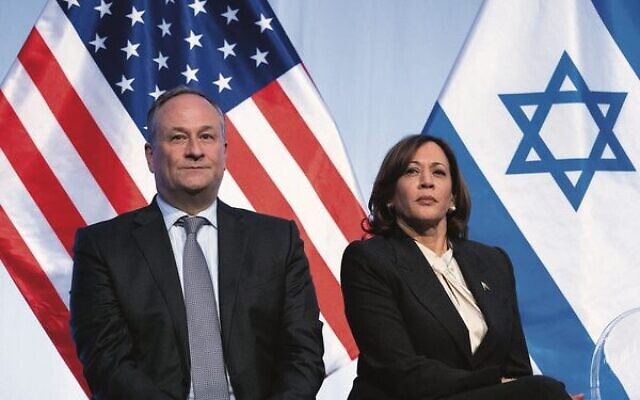Emhoff and Harris talk combating antisemitism
She described "a venom coursing through our country" and said, "We are the antidote."

(JTA, TIMES OF ISRAEL) – A Rosh Hashanah celebration last Tuesday at US Vice-President Kamala Harris’s official residence was a celebration of American Jewish success that included a reminder of the threats Jews still face.
Douglas Emhoff, the Second Gentleman, began by noting his amazement that as the descendant of Jews fleeing antisemitism in Eastern Europe more than a century ago, he has made history as the country’s first second gentleman, and the first Jewish spouse of a president or vice-president.
“I want to remind you all that it’s great to be Jewish!” Emhoff said to cheers. There were about 150 people in attendance, including Jewish organisational leaders, politicians and entertainment figures.
But he and Harris also emphasised the threat of antisemitism. Emhoff said the interagency task force he chairs is continuing apace in executing the White House’s strategy to combat antisemitism, although he was light on details.
“We are putting this plan into action,” he said. “I’ve been meeting with mayors, I’ve been meeting with leaders.”
Harris, citing reported spikes in antisemitism and other attacks on minorities, said the moment demanded action.
“We are being presented with a wake-up call, the blast of the shofar,” she said. “We are dealing with very powerful forces that are attempting to wage what I think is a full-on attack against hard-won freedoms, liberty.”
She described “a venom coursing through our country” and said, “We are the antidote.” She quoted Prikei Avot (the Ethics of the Fathers): “It is not your duty to finish the work, but neither are you at liberty to neglect it.”
Meanwhile, in his Rosh Hashanah message, Israel’s President Isaac Herzog acknowledged it had been a year of “challenge” and “struggle”, and told Jewish communities around the world that “having differences and being able to voice them is a sign of strength – strength of our democracy, and strength of our people”.
In the English message, Herzog said he hoped Jews in Israel and around the world would make an effort “to get to know these differences, which are the source of the richness, the resilience of our society, to try to really hear, to listen, and to open our hearts”.
This, so “that we can touch once again what is most true: our belonging to each other, and to the great story we carry together”, he said.
“As we say, ‘kol Israel arevim zeh bazeh,” said the President in reference to the famous Talmudic phrase that means that the Jewish people are responsible for one another.
“This act of listening is the first and most crucial step in healing our rifts,” he added.
Noting his previously announced initiative for worldwide Jewish dialogue, Herzog expressed hope for “a global Jewish conversation that is inclusive, vibrant, empowering and will also impact the nation-state of the Jewish people.”
Last Wednesday, Herzog – who has spent months trying to mediate between the hardline coalition and the opposition on the former’s efforts to overhaul the country’s judiciary – warned that Israel was facing a threat from within and urged its leaders to find a compromise, saying his latest proposal was widely supported in both the coalition and the opposition.
Warnings against the overhaul plan have also come from across the Diaspora, with increasingly hardline Israeli governments seen as driving a wedge between the Jewish State and Jewish communities that have historically been highly supportive of Israel.
In his televised speech, filmed at the Latrun military site at an event to mark 50 years since the 1973 Yom Kippur War, Herzog said the political leadership must show “courage and responsibility to get us out of this crisis”.

comments